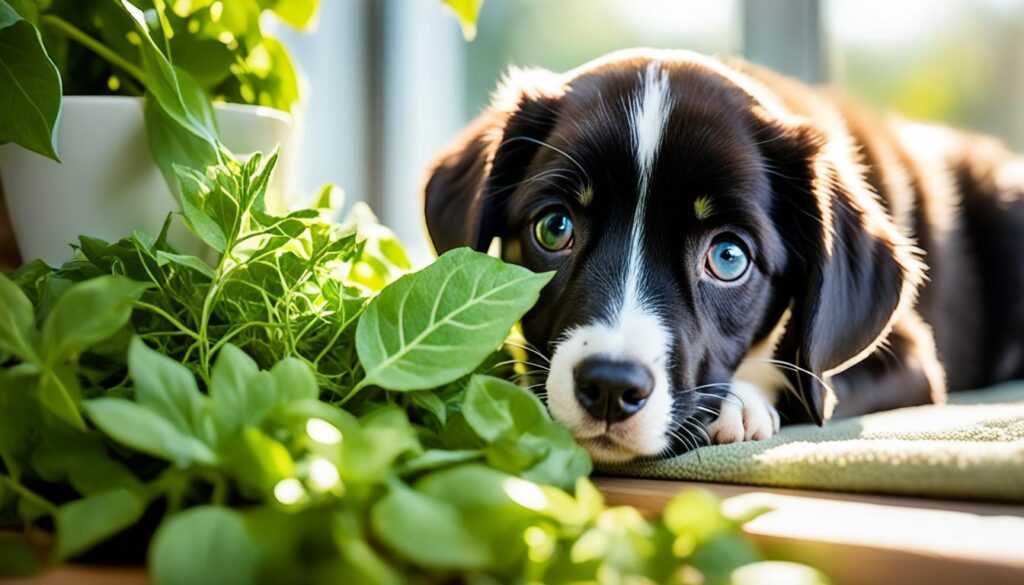Did you know over 700 plant species might be toxic to pets? It’s shocking for any pet lover who likes plants in their home. But, there’s hope! We’re going to show you the best pet friendly plants for your pets’ safety.
Some non-toxic houseplants can still hurt pets if they eat them. They might cause problems like seizures or shaking. Even the best pets might nibble on plants. So, we talked to Dr. Judy Morgan, a vet from New Jersey. She shared tips on picking safe plants for pets. These plants are safe for our furry friends.

Key Takeaways
- Over 700 plant species are potentially toxic to pets
- Certain non-toxic houseplants can be dangerous if ingested by pets
- Veterinarian Judy Morgan provides expert advice on selecting safe plants for pets
- Prioritizing pet-friendly plants ensures a harmonious home environment
- Proper care and placement of plants is key to keeping pets safe
Importance of Pet-Safe Plants
As pet owners, we must be careful about the plants in our homes. Lots of well-liked houseplants can harm our pets. This danger threatens their health, even if they’re usually well-behaved.
Avoiding Toxic Plants for Pets
We need to know which plants are safe and which are not. Some, like lilies, sago palms, and certain ivy, can cause serious problems. By choosing safe plants, our homes can be safe for pets to wander.
Creating a Harmonious Environment
It’s not just about picking the right plants. We should arrange our space so that plants and pets can thrive together. This means putting plants where pets can’t get them and using pet-friendly soil.
Choosing tough, non-toxic plants helps a lot. It lets us have a green home without risking our pets’ health.
Top Pet Friendly Plants for Your Home
Looking to create a safe, green place for pets and people at home? Try these plants. They’re safe and loved by all.
Chinese Money Plant (Pilea peperomioides)
The Chinese money plant is celebrated not just for its unique, coin-shaped leaves but also for its easy propagation and non-toxic nature to pets. Thriving in indirect sunlight, it requires moderate watering, making sure the soil is dry between watering sessions. Rotate the plant with each watering to ensure even growth. This plant is ideal for adding a touch of nature to your living space while being completely safe for your pets.
Money Tree (Pachira aquatica)
The money tree is another excellent choice for pet owners. Its braided trunk and lush, green leaves add an element of sophistication to any room. It prefers indirect light and needs water every one to two weeks, depending on the humidity in your home. Its ability to adapt to a range of lighting conditions and its resilience make it a popular plant among pet owners.
Hoya Varieties
Hoyas, such as Hoya carnosa and Hoya obovata, are known for their waxy leaves and star-shaped flowers. They are particularly forgiving plants, thriving in anything from low to bright indirect light. These plants require less frequent watering, and their sweet-smelling flowers can be a delightful addition to any pet-friendly home. Hoyas are ideal for pet owners looking for low-maintenance yet attractive plants.
African Violet (Saintpaulia)
African violets bring a splash of color with their vibrant purple or pink flowers. Originating from Tanzania, these small plants prefer well-draining soil and moderate to bright indirect light. They require consistent moisture but dislike having water on their leaves, so it’s best to water them from the bottom. Their compact size makes them perfect for places where space is at a premium.
Blue Echeveria
Blue echeveria is a succulent that thrives in dry conditions and requires minimal care, making it ideal for those new to indoor gardening. Its rosette shape and silver-blue color provide a striking contrast to green foliage. It needs bright light and sparse watering, making it a fuss-free option for busy pet owners.
Bromeliad
Bromeliads, like pineapple plants, are striking with their bright, exotic flowers and sturdy leaves. They thrive in indirect light and require minimal care, needing water only in their central cup. Their vibrant appearance can enhance any area, making them a fantastic choice for adding a pop of color to your pet-safe space.
Calathea (Prayer Plant)
Calathea, or prayer plants, are known for their expressive leaf movements and beautiful leaf patterns. They thrive in humid conditions with indirect light, making them ideal for bathrooms or kitchens. Regular misting helps maintain the humidity they love. Their non-toxic nature and dynamic appearance make them a safe and visually appealing choice for pet owners.
Sunflower
Sunflowers can be grown indoors with sufficient light, bringing a cheerful and sunny vibe to your space. They require a good amount of sunlight and regular watering. Their towering height and bright flowers can create a focal point in any room, all while being safe for pets.
Cast Iron Plant (Aspidistra Elatior)
Known for its resilience, the cast iron plant can survive in low light conditions and infrequent watering, making it perfect for less attentive plant owners. Its lush, dark green leaves provide a soothing green backdrop in any indoor setting, and its non-toxic nature makes it safe for pets.
Pet-Safe Ferns and Palms
Boston ferns and bamboo palms are excellent choices for adding lush greenery to your home without the risk to pets. Boston ferns thrive in high humidity and indirect light, while bamboo palms bring a tropical feel to your home and do well in low light conditions. Both are non-toxic to pets and can help purify the air in your home.
Caring for Pet Friendly Plants
Keeping your pets safe and your plants happy is key. Put pet-friendly plants up high or in hanging pots. This stops pets from eating the leaves. It’s also good to keep your plants trimmed so they stay neat and tidy.
Proper Watering and Lighting
It’s important to give your pet-friendly plants the water and light they need. The Chinese money plant likes water once every week or two. Turn it around each time you water it to help it grow evenly.
For the money tree, it prefers medium to bright light. Water it every one to two weeks. Hoyas need more water if they’re in a really bright spot. They like high light but can do okay in low light too. If you see their leaves are changing, they might need more water.
| Plant Name | Light Requirements | Water Requirements | Pet Safe |
|---|---|---|---|
| Chinese Money Plant | Indirect sunlight | Water every 1-2 weeks, soil should dry out | Yes |
| Money Tree | Medium to bright indirect | Water every 1-2 weeks | Yes |
| Hoya Varieties | Low to bright indirect | Less frequent, when soil is dry | Yes |
| African Violet | Moderate to bright indirect | Consistent moisture, water from the bottom | Yes |
| Blue Echeveria | Bright light | Water sparingly every few weeks | Yes |
| Bromeliad | Indirect light | Water in central cup, minimal care | Yes |
| Calathea (Prayer Plant) | Indirect light, humid | Regular misting, keep soil moist | Yes |
| Sunflower | Full sunlight | Regular watering, moist soil | Yes |
| Cast Iron Plant | Low light | Water infrequently, tolerates dry soil | Yes |
| Pet-Safe Ferns and Palms | High humidity, indirect light for ferns; low light for palms | Keep soil moist, more frequent for ferns | Yes |
Pick the right pet-friendly plants and care for them well. This will make a beautiful, safe space for both your plants and pets.
Choosing the Right Pet Friendly Plants
Finding the right plants keeps your pets and home safe. You can pick from many pet-friendly options to add beauty to your space. Let’s look at the best choices for dogs and cats.
Plants Safe for Dogs
Top picks for dogs are the Spider Plant, Burro’s Tail, Chinese Evergreen, and Boston Fern. These plants are safe and not interesting to pups. Make sure you place them where your dog can’t reach to prevent accidents.
Cat-Safe Plant Varieties
Cats like specific plants that are safe for them. Catnip, Bamboo, and Peacock Plant are great choices. Herbs like Rosemary, Basil, and Thyme are also fun and safe for indoors.
Choosing the right plants keeps both your home and pets happy. With a little knowledge and planning, your home can be full of greenery. This will be a great place for you and your pets to enjoy together.
Conclusion
Adding pet-friendly plants to your home is a great idea. It helps make your space happy and safe for everyone. There are many plants, like the Chinese money plant or cast iron plant, that are good for pets and thrive indoors.
It’s important to pick plants that are safe for pets and easy to take care of. By choosing the right plants and caring for them, you can enjoy a greener home. And, you won’t have to worry about your pets getting sick if they nibble on a leaf.
This guide is for all plant lovers, whether you’re new or have a green thumb. It gives you tips and ideas for creating a plant-filled home that’s good for pets and people. Enjoy the process of picking out pet-friendly plants. They will make your home look better and feel fresh.
